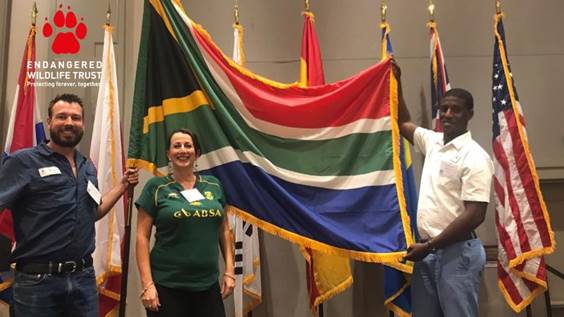The Endangered Wildlife Trust (EWT), an Amphibian Survival Alliance partner, is extremely proud to announce that two of its programmes, the Wildlife and Energy and Wildlife and Transport programmes, were recipients last night of the International Conference on Ecology and Transportation (ICOET) International Stewardship Award for their innovative and holistic approach to tackling the impacts of linear infrastructure, such as roads and power lines, on wildlife in Africa.
The International Stewardship Award is presented to agencies or organisations that demonstrate, through the results of their actions, a cooperative effort to maintain or restore ecological function in the midst of transportation above the regulatory requirements. Lourens Leeuwner, EWT Wildlife and Energy Programme Manager, and Wendy Collinson, EWT Wildlife and Transport Programme Manager, won the prestigious award on behalf of the organisation. African economies are currently among the fastest growing in the world, and this is reflected in expansion plans for road, rail and energy transmission lines, with high concentrations of such projects slated to occur in environmentally sensitive areas. The EWT’s Wildlife and Transport and Wildlife and Energy programmes are working to address these environmental challenges, through putting plans in place to implement mitigation methodologies – one of the first African NGOs to do this. The EWT believe in a less siloed approach that combines all forms of transportation and energy, since these necessary modes usually coexist and have multiple negative impacts on biodiversity. “It is an honour to be nominated, it is an outstanding achievement to reach the finals, and an exceptional milestone and celebration of excellence to win one of these awards,” said Wendy Collinson.
The Wildlife and Transport Programme has improved our understanding of the impacts of transportation-linear infrastructure, namely rail and roads, on wildlife over the last nine years in South Africa, establishing partnerships with relevant stakeholders to provide measures to reduce the impacts on wildlife, whilst the Wildlife and Energy Programme has been working in partnership with Eskom for the last 23 years, developing solutions to wildlife and energy infrastructure impacts. This partnership is internationally recognised as a leader in the implementation of innovative solutions to curb the impact of electrical infrastructure on wildlife.
“Our results are not limited to ‘quick-fix temporary solutions’ but demonstrate sustainable products,” elaborated Lourens Leeuwner. “One of the EWT’s mitigation success stories has demonstrated that bird mitigation on electrical infrastructure reduces collision mortality by approximately 90%.”
ICOET is a biennial international event that addresses the broad range of ecological issues related to linear infrastructure systems, namely, roads, rail and power lines. Experts from these fields gather at ICOET to share current research, quality applications, and best practises that can enhance both the project development process and the ecological sustainability of all these modes. The ICOET gala dinner took place in California, USA on Monday, 23 September, and celebrated the most outstanding contributions to ecological stewardship. Fraser Shilling of the Road Ecology Center at UC Davis, and the main organisers of ICOET said, “The EWT unites industry and wildlife impacts in Africa, working towards shared objectives, expanding knowledge, and understanding how to ultimately minimise the threat to wildlife.”
The core supporters of the EWT’s Wildlife and Transport Programme are Bakwena Platinum Corridor Concessionaire, De Beers Group of Companies, Ford Wildlife Foundation, N3 Toll Concession, GreenMatter, and TRAC N4; the core project of the EWT’s Wildlife and Energy Programme is the Eskom/EWT Strategic Partnership. Both programmes are dedicated to minimising the negative interactions between wildlife and linear infrastructure.

